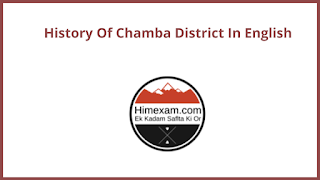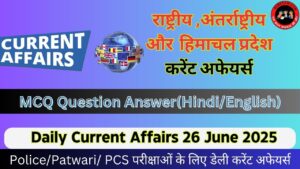History Of Chamba District In English
||History Of Chamba District In English|| Chamba District History In English||
In the hills of the chamba, Madra-Salva, Yudheya, Odumbar and Kiratas established their kingdoms. Chamba was also under Indo-Greek and Kushans.
1. Establishment of Chamba princely state – Chamba princely state was founded in 550 AD by Suryavanshi King Maru who came from Ayodhya. Maru made Bharmour (Brahmapur) his capital. Adityavarman (620 AD) first assumed the title of Varman.
2. Meru Varman (680 AD) – Meru Varman became the most powerful king of Bharmour . Meru Varman extended his kingdom up to the present Chamba city. He defeated King Datteshwar Pal of Kullu. Meru Varman built the Manimahesh Temple in Bharmour, the Lakshana Devi Temple, the Ganesh Temple, the Narasimha Temple and the Shaktidevi Temple in Chhattaradi. Gugga was the famous artisan of Shilpimeru Varman.
3. Lakshmi Varman (800 AD) – Most of the people died due to the epidemic during the tenure of Lakshmi Varman. The Tibetans (Kirat) occupied most of the areas of the Chamba princely state. After the death of Lakshmi Varman, the princely state of Kullu became independent from Chamba with the help of the king of Bushehr.
4. Musan Varman (820 AD) – After the death of Lakshmi Varman, the queen fled the kingdom and gave birth to a son in a cave. The queen moved forward leaving the son in the cave. But after knowing the truth of the Wazir and the priest, when he returned to the cave, he found many mice protecting the child. From here the king was named ‘Musan Varman’. Rani and Moosan Varman remained with the king of Suket. The king of Suket married his daughter to Musan Varman and gave her the manor of Pangana in dowry. Musaan Varman regained control of Brahmapur with Suket’s army. Mousan Varman had banned the killing of rats during his reign.
5. Sahil Varman (920 AD) – Sahil Varman (920 AD) founded the city of Chamba. Raja Sahil Varman had ten sons and a daughter named Champa Vati. He named the city of Chamba after his daughter Champa Vati. He took the capital from Brahmapur to Chamba. Rani Naina Devi, wife of Sahil Varman sacrificed her life for the arrangement of water in the city, since then Suhi fair is celebrated every year in the memory of Rani Naina Devi. This fair is famous for women and children. Raja Sahil Varman got Lakshmi Narayan, Chandrashekhar (Sahu) Chandragupta and Kameshwar temple constructed.
6. Yugankar Varman (940 AD) – Tribhuvan Rekha Devi, wife of Yugankar Varman (940 AD), built the Narasimha Temple at Bharmour. Yugankar Varman built the Gauri Shankar Temple at Chamba.
7. Salvahana Varman (1040 AD) – According to Rajatarangini, Anantdev, the ruler of Kashmir, invaded Bharmour during the time of Salwahana Varman.
8. Jasata Varman (1105 AD) – Jasata Varman supported his relative Harsha and his ships Bhikshchara against King Sushala of Kashmir. The inscription of the time of Jasata Varman is found in the iron takery of Churah.
9. Udaya Varman (1120 AD) – Udaya Varman married his two daughters Devlekha and Taralekha from Raja Sushala of Kashmir who became Sati after the death of Sushala in 1128 AD.
10. Lalit Varman (1143 AD)
11. Vijay Varman (1175 AD) – Vijay Varman took advantage of the invasions of Muhammad Ghori in 1191 AD and 1192 AD and occupied many areas of Kashmir and Ladakh.
12. Ganesh Varman (1512 AD) – Ganesh Varman first used the title ‘Singh’ in the Chamba Raj family.
13. Pratap Singh Varman (1559 AD) – After the death of Ganesh Varman in 1559 AD, Pratap Singh Varman became the king of Chamba. He was a contemporary of Akbar. The Rihalu area from Chamba was given to the Mughals by Todarmal. Pratap Singh Varman had defeated Guler Chandra Pal of Kangra and merged Guler into the princely state of Chamba.
14. Balabhadra (1589 AD) and Janardhan – Balabhadra was very kind and generous. People called him ‘Bali-Karna’. His son Janardhan removed him from the throne and sat on the throne himself. At the time of Janardhan, King Surajmal of Nurpur escaped from the Mughals and was hiding in his princely state. Surajmal’s brother Jagat Singh was made the protector of the Kangra Fort by the Mughals, who became the king of Nurpur after Surajmal. During Jahangir’s visit to Kangra in 1622 AD, the king of Chamba went to meet Janardhan and his brother Jahangir. There was a battle in the battle between Chamba’s King Janardhan and Jagatsingh in which Chamba’s army was defeated. Bhismar, Janardhan’s brother was killed in the war. Janardhan was also deceived by Jagat Singh in 1623 AD. Balabhadra was again made king of Chamba. But Chamba remained in the possession of Jagatsingh for 20 years.
||History Of Chamba District In English|| Chamba District History In English||
15. Prithvi Singh (1641 AD) – Jagat Singh revolted against Shahjahan in 1641 AD. Taking advantage of this opportunity, Prithvi Singh, with the help of Mandi and Suket, crossed the Rohtang Pass, Pangi, Churah and reached Chamba. Raja Mansingh of Guler, who was an enemy of Jagat Singh, also helped Prithvi Singh. Prithvi Singh gave a good tahsil to King Sangram Pal of Basauli and aligned with him. Prithvi Singh, after attaining his kingdom, built a kothi for the Raj officers in Churah and Pangi. There was a dispute between Prithvi Singh and Sangram Pal over the Bhalai tehsil, which was resolved by the Mughals. Bhalai was given to Chamba in 1648 AD. Prithvi Singh was a contemporary of Mughal emperor Shah Jahan. He traveled to Delhi 9 times during the reign of Shah Jahan and got the statue of ‘Raghubir’ by Shah Jahan in Bhat. Khajjinag (Khajiyar), Hidimba Temple (Mahela) in Chamba,
16. Chatar Singh (1664 AD) – Chatar Singh invaded Basauli and captured Bhalei. Chatar Singh was a contemporary of Aurangzeb. He refused Aurangzeb’s orders to destroy all Hindu temples in 1678 AD.
17. Uday Singh (1690 AD) – After the death of his uncle Wazir Jai Singh, Raja Udai Singh, the son of Chatar Singh, appointed a barber to fall in love with his daughter and appointed the wazir of Chamba.
18. Ummed Singh (1748 AD) – During the reign of Ummed Singh, Chamba kingdom spread to the boundary of Mandi. Ummed Singh’s son Raj Singh was born in Rajnagar. Umaid Singh built ‘Nada Mahal’ in Rajnagar. The foundation of Rangmahal (Chamba) was also laid by Ummed Singh. After her death, she left the order to the queen not to commit sati. Umaid Singh died in 1764 AD.
19. Raj Singh (1764 AD) – Raj Singh became king at the age of 9 after the death of his father. Proud Chand snatched the path from Chamba. But Rani retrieved it with the help of Ranjit Singh of Jammu. There was a war between Raja Raj Singh of Chamba and Raja Sansar Chand of Kangra to occupy the Rihalu area. Raja Raj Singh died during the war in 1794 AD near Shahpur. Nikka, Ranjha, Chhajju and Harku were accomplished artists in the court of Raj Singh.
20. Jeet Singh (1794 AD) – During the time of Jeet Singh, Chamba state sent Nathu Wazir with soldiers in the war against Sansarchand. Nathu Wazir went to fight a war under Gorkha Amar Singh Thapa, Mahanchand etc. of Bilaspur.
21. Charhat Singh (1808 AD) – Charhat Singh became king at the age of 6 . Nathu Wazir used to watch the government. Rani Sharda (Mother of Charhat Singh) established the Radha Krishna Temple in 1825 AD. Rajadar Ratun of Padar attacked Zaskar in 1820-25 AD and made him a part of Chamba. After the death of Nathu Wazir in 1838 AD, ‘Wazir Bhaga’ was appointed the Wazir of Chamba. In 1839, Vigne and General Cunningham traveled to Chamba. Charhat Singh died at the age of 42 in 1844 AD.
22. Mr. Singh (1844 AD) – Mr. Singh ascended the throne at the age of 5 years. The Lakshadshah Brahmin was controlling the https://himexam.com/wp-content/uploads/2021/12/Madhya-Pradesh-MP-PEB-Group-2-Sub-Group-4-Various-Post-Answer-Key-2021.jpgistration at the time of Mr. Singh, who was killed in a bull. The British gave Raja Gulab Singh of Jammu to Chamba in 1846 AD, but with the efforts of Wazir Bhaga, Sir Henry Llerance allowed the current status of Chamba. Bhadarwah was forever transferred from Chamba to Jammu. At the time of Shri Singh, Chamba came under the British in 1846 AD. Mr. Singh was awarded a treaty on April 6, 1848.
Shrin Singh remained devoted to the British at the time of the Revolt of 1857 AD. He sent army under Mian Avtar Singh to help the British at Dalhousie. Wazir Bhaga retired in 1854 AD and was replaced by Wazir Billu. Major Blair Reid became the superintendent of Chamba in 1863 AD. The post office was opened in 1863 AD. The Chamba forests were given to the British on a lease of 99 years. Mr. Singh died in 1870 AD.
23. Gopal Singh (1870 AD) – Mr. Singh’s brother Gopal Singh ascended the throne. He did many things to enhance the beauty of the city. During his tenure, Lord Mayo Chamba came in 1871 AD. Gopal Singh was removed from the throne and his elder son Sham Singh was made king in 1873 AD.
24. Sham Singh (1873 AD) – Sham Singh was made king at the age of 7 by General Renal Taylor and Mian Avtar Singh was made the wazir. Sir Henry Davis traveled to Chamba in 1874 AD. Sham Singh attended the Delhi Durbar of 1875 AD and 1877 AD. In the year 1878 AD, John Harry was appointed as the teacher of Sham Singh. The Durbar Hall in the palace of Chamba was added after the name of CHT Marshal. In the year 1880 AD, cultivation of haps started in Chamba. Sir Charles Etikasn traveled to Chamba in 1883 AD.
In 1875 AD, Colonel Reid’s hospital was demolished and in 1891 AD, a 40-bed Sham Singh Hospital was built. The Shitala bridge over the Ravi river which was broken in 1894 AD. An iron suspension bridge was built in its place. Bhatiyat revolts in 1895 AD. Mian Bhuri Singh, younger brother of Sham Singh, was made a wazir in 1898 AD. In 1900 AD, Lord Curzon and his wife visited Chamba. In 1902 AD, Sham Singh fell ill. In the year 1904 AD, Bhuri Singh was made the king of Chamba.
25. Raja Bhuri Singh (1904 AD) – Raja Bhuri Singh was conferred with the title of Knighthood on 1 January 1906 AD. Bhuri Singh Museum was established in 1908 AD. Raja Bhuri Singh assisted the British in the First World War (1914–18). A power house was constructed on Sal river in 1910 AD, which provided electricity to the city of Chamba. Raja Bhuri Singh died in 1919 AD. After the death of Raja Bhuri Singh, Tikkaram Singh (1919–1935) became the king of Chamba.
26. Raja Laxman Singh – Raja Laxman Singh was made the last king of Chamba in 1935 AD. The Chamba princely state became a part of Himachal Pradesh on April 15, 1948.
||History Of Chamba District In English|| Chamba District History In English||










